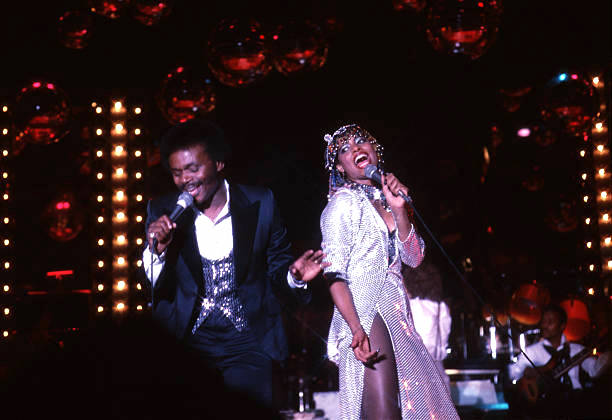There’s only one “Reunited.” Peaches & Herb’s gauzy, gooey ballad is pure polyester pop, a disco-era kitsch classic endlessly repurposed and recontextualized across a dizzying array of sitcoms, advertisements and memes.
There’s a whole lot of Peaches, however. While Herb Fame has remained a constant in the R&B duo since its 1966 introduction, no fewer than seven different women have assumed the role of Peaches over the decades, most famously Linda Greene, whose vocals are featured on “Reunited” as well as the team’s other Me Decade smash, “Shake Your Groove Thing.”
Before he was Herb Fame, he was Herbert Feemster, a Washington, D.C. native who spent his childhood singing in church and neighborhood doo-wop groups. After marrying his high school sweetheart and serving as an electrician’s mate in the U.S. Navy, Feemster returned to civilian life by accepting a job at the Waxie Maxie, a Howard University-adjacent record store frequented by music industry executives. “I’d always ask them to listen to me sing, and they never would,” he told The Washington Post in 2009.
Feemster’s luck changed when he introduced himself to Van McCoy, a former songwriter for the hit-making production duo of Jerry Lieber and Mike Stoller. In mid-1964, McCoy signed on as a staff writer with April-Blackwood, the publishing arm of Columbia Records, and after auditioning Feemster in the Waxie Maxie stock room, he and A&R exec Dave Kapralik, his partner in Daedalus Productions, returned one week later with a contract from Columbia’s new Date Records subsidiary. McCoy wrote, arranged and co-produced the newly minted Herb Fame’s 1966 debut single “You’re Messin’ Up My Mind,” but when the record flopped, Kapralik suggested pairing the singer with another fledgling Date artist: Francine Hurd, known to friends and family as “Peaches” thanks to her genteel manner.

Like Herb Fame, Hurd was born and raised in D.C., singing in a series of schoolgirl groups before joining the Darlettes alongside Dyanne Stewart and Nancy J. Johnson. The Darlettes debuted in 1965 with the McCoy-produced “Lost,” released on the Mirwood label’s Mira subsidiary. After moving to Date, the trio adopted a new moniker, the Sweet Things, for “You’re My Loving Baby,” issued in early 1966.
When the Sweet Things’ Motown-inspired “I’m in a World of Trouble” fell flat, Barker and Fame joined forces for the aptly-titled “We’re in This Thing Together,” their first collaboration under the Peaches & Herb guise. The record went nowhere until late 1966, when St. Louis R&B station KATZ flipped it over and began playing its B-side, a cover of Harold Arlen and Ted Koehler’s title song for the 1933 film musical Let’s Fall in Love. The Peaches and Herb version soon caught on nationwide, and in March 1967, “Let’s Fall in Love” peaked at number 21 on the Billboard Hot 100.
Peaches & Herb’s follow-up, a cover of the Chuck Willis-penned “Close Your Eyes” — a 1955 smash for the Five Keys — fared even better, soaring to number four on the R&B chart and number eight on the pop chart. “For Your Love,” originally written and performed by Ed Townsend (later the co-writer and co-producer of Motown icon Marvin Gaye’s carnal classic “Let’s Get It On”), reached number 10 R&B/number 20 pop, and Peaches & Herb closed out the year with their fourth consecutive Top 20 hit, a reading of the Mickey and Sylvia perennial “Love Is Strange,” which climbed to number 13 on the Hot 100 and number 16 on the R&B countdown.
Date threw its marketing muscle behind Peaches & Herb, sending the duo on tour and dubbing them “The Sweethearts of Soul,” leading many fans and media members to speculate on the nature of their offstage relationship. “We’re good friends,” Fame said in 1967. “A lot of our fan mail asks if we’re married, and so many people want to know if we’ve ‘set the date.’ I guess to our fans, we’re sweethearts. That’s our image, so I guess we’ve got to uphold it.” (Peaches was in fact wed to another man, and later cut a series of solo singles for Columbia under her married name, Francine Barker.)

Peaches & Herb struggled to maintain their early commercial momentum as 1968 dawned: the portentously titled Intruders cover “United,” their first single of the new year, hit number 11 on Billboard’s R&B charts, but failed to reach the pop Top 40. Follow-ups like “The Ten Commandments of Love” and “So True” also struggled to generate interest at radio, and in late 1968, Barker retired from touring, although she and Fame continued to record under the Peaches & Herb name. Daedalus Productions hired as Barker’s touring replacement Marlene Mack, previously immortalized on the Jaynetts’ spectral girl-group opus “Sally Go ‘Round the Roses,” and both versions of the duo continued to diminishing returns until 1970, when Barker started a family and Feemster quit the music business to join the Washington D.C. police force. “We never reached the ultimate in success,” he told Britain’s Blues & Soul magazine in 1977. “I decided to give it all up for personal reasons. It wasn’t an overnight decision.”
Feemster spent six years with the D.C. police, but yearned to return to performing. “Every time I’d go to a concert, I’d want to be up there,” he confessed to Blues & Soul. “[But] what really turned me around was being involved in a hold-up where I found myself shooting at a guy while he was shooting back at me. Then I knew it was time to get back into the business.”
When Feemster reconnected with Van McCoy (who in 1975 headlined his own million-selling disco smash “The Hustle,” a number one hit on both the Billboard Hot 100 and Hot Soul Singles charts), McCoy suggested reviving Peaches & Herb with a new better half, recommending for the role Linda Greene, another D.C. native who had recently returned home after pursuing a career in modeling. “I bumped into Van McCoy and told him I was at home now, and wished I could get into the record business,” Greene told the Associated Press. “I thought I was ready to handle something like that.” Feemster’s manager arranged a meeting, and the latest incarnation of Peaches & Herb signed to MCA Records to release their McCoy-produced comeback LP, a self-titled effort that spawned the minor hit single “We’re Still Together.”

Peaches & Herb landed at Polydor imprint MVP for 1978’s 2 Hot!, produced by the label’s founder, Fame’s longtime friend Freddie Perren, at his Mom & Pop’s Company Store recording facility in Studio City, Calif. Perren first rose to renown as an integral cog in The Corporation, the Motown Records writing and production team responsible for a series of number one hits for the Jackson 5, including “I Want You Back” and “ABC.” Perren entered the 2 Hot! sessions on a hot streak: his production work for Tavares’ “More Than a Woman” and Yvonne Ellman’s “If I Can’t Have You” was featured on 1977’s landmark Saturday Night Fever soundtrack, the multi-platinum set responsible for catapulting disco subculture into the pop mainstream.
Around this same time, Perren was working with lyricist Dino Fekaris to fine-tune a song called “I Will Survive,” penned by Fekaris after his dismissal from the Motown writing staff. While he and Perren continued to search for a singer to record “I Will Survive” (a path that ultimately led to disco diva Gloria Gaynor), they also workshopped another disco tune, the exuberant “Shake Your Groove Thing,” alongside a gossamer ballad titled “Reunited,” two of the eight Fekaris/Perren co-writes that comprise 2 Hot!
“Shake Your Groove Thing” was selected as the first single, hitting radio and retail in the final weeks of 1978 — perfectly timed to reach an American public still in thrall to the disco juggernaut. The single spent 22 weeks on the Billboard charts, reaching number five on the Hot 100 and number four on the R&B Chart in addition to spending four consecutive weeks at number two on the Disco chart, behind Chic’s immovable “Le Freak.” Fearing the success of “Shake Your Groove Thing” might get them typecast as a disco act, Peaches & Herb “decided to make our next release something totally different,” Fame said. “We went for an R&B ballad, and that was ‘Reunited.'”

“Reunited” needs no further introduction. You’ve heard it many times before — in supermarkets, in sitcoms, on social media. You’re already humming its melody, murmuring “Reunited, and it feels so good” and chuckling about how corny and saccharine the song is. But “Reunited” didn’t top both the pop and soul charts or sell more than two million copies by mistake. Fekaris and Perren set out to author the kind of achingly sincere, unabashedly sentimental ballad that defines moments in listeners’ lives, and thanks in large part to Peaches & Herb’s lilting harmonies and off-the-charts chemistry, they nailed it. “When Peaches first heard [‘Reunited’], she started to cry, while Herb just stood there shaking his head,” Perren told Blues & Soul in 1980.
“That was the ultimate song on the album for me,” Greene explained. “It was overwhelming just to listen to the words of that song. It was not written about myself and Herb as a couple’s relationship. Dino Fekaris and Freddie wrote it for the people who could truly relate to it.”
Peaches & Herb re-teamed with Perren for 1979’s Twice the Fire, but sales were sluggish, and as listener interest in disco waned, the duo continued to flounder. Peaches & Herb left MVP in the wake of 1981’s Sayin’ Something, and after one final effort for Columbia, 1983’s Remember, Fame and Greene split. The latter went on to record a handful of gospel albums with her husband, songwriter Stephen Tavani, while the former returned to law enforcement, working as a deputized court security officer for the U.S. Marshals Service.
Fame again revived the Peaches & Herb brand in 1990, this time alongside Patrice Hawthorne, who rose from obscurity via the Natalie Cole-hosted television talent show Big Break. This fourth incarnation of Peaches & Herb toured only infrequently and did not record; Fame subsequently partnered with one-named singer and breast cancer advocate Miriamm, followed by Wanda Makle (or is it Tolson?) and eventually Meritxell Negre, with whom he recorded 2009’s Colors of Love, the first Peaches & Herb album in more than a quarter of a century. There may be still even more Peaches (maybe even you!), so stay tuned to KORD for updates.

“As long as I’m alive, the [Peaches & Herb] name will stay there. The name will stay alive,” Fame vowed in a 2020 interview with uDiscover Music. “I work. I believe in work. I believe if a man is capable of working… if he’s healthy enough to do it… then you do it. I don’t believe in retirement. I’ll just work until I fade away.”






